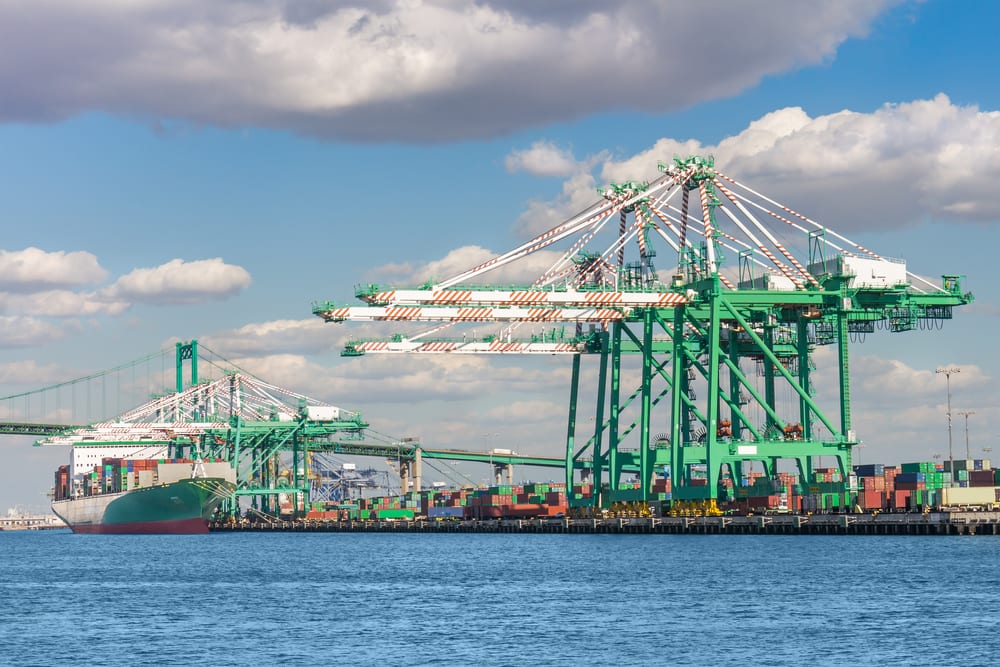Port of Los Angeles. File Photo: Shutterstock/Rhonda Roth
By Bryce Baschuk (Bloomberg) — The World Trade Organization undercut the main justification for President Donald Trump’s trade war against China, saying that American tariffs on Chinese goods violate international rules.
A panel of three WTO trade experts on Tuesday said the U.S. broke global regulations when it imposed tariffs on Chinese goods in 2018. Washington has imposed levies on $400 billion in Chinese exports.
The panel said in its report “that the United States had not met its burden of demonstrating that the measures are provisionally justified.”
While the ruling bolsters Beijing’s claims, Washington can effectively veto the decision by lodging an appeal at any point in the next 60 days. That’s because the Trump administration has already paralyzed the WTO’s appellate body, a tactic that has rendered toothless the world’s foremost arbiter of trade.

“Although the panel did not dispute the extensive evidence submitted by the United States of intellectual property theft by China, its decision shows that the WTO provides no remedy for such misconduct,” U.S. Trade Representative Robert Lighthizer said in a statement. He added that the report has no effect on the phase-one agreement between the nations.
The dispute centers on the Trump administration’s use of a 1970s-era U.S. trade law to unilaterally launch its commercial conflict against China in 2018.
China claimed the tariffs violated the WTO’s most-favored treatment provision because the measures failed to provide the same treatment to all WTO members. China also alleged the duties broke a key dispute-settlement rule that requires countries to first seek recourse from the WTO before imposing retaliatory measures against another country.
In a statement, China’s Ministry of Commerce said the nation “approves of the objective and fair ruling of the expert group.” It repeated Chinese criticisms of unilateralism and described the WTO as the “core of the multilateral trading system which forms the cornerstone of multilateral trade.”
“China hopes that the American side will fully respect the ruling of the expert group”
The U.S. tariffs against China were authorized under Section 301 of the Trade Act of 1974, which empowers the president to levy tariffs and other import restrictions whenever a foreign country imposes unfair trade practices that affect U.S. commerce. The Trump administration has claimed the tariffs were necessary to confront China’s widespread violations of intellectual property rights and forced technology transfer policies.
Though the use of Section 301 isn’t unprecedented, the provision largely fell out of favor in the 1990s after the U.S. agreed to first follow the WTO’s dispute-settlement process before it triggered any retaliatory trade actions.
No Winners
Since the Trump administration has refused to appoint new members to the WTO’s appellate body, the next step could involve the U.S. simply appealing this panel report “into the void,” effectively ending the legal nature of this dispute, said Chad Bown, a senior fellow at the Peterson Institute for International Economics.
“China’s retaliatory tariffs were also arguably a violation of WTO rules,” he said “Beijing took matters into its own hands by imposing tariffs over its grievances before any WTO rulings were issued. There are no winners in this dispute. The United States, China and especially the WTO are all losers.”
While the European Union has so far been spared U.S. levies based on the controversial Section 301, the 27-nation bloc may breathe a sigh of relief over Tuesday’s WTO verdict. That’s because the Trump administration has threatened to use Section 301 to hit European goods with levies in retaliation over the taxation of digital companies in the EU.
–With assistance from Jonathan Stearns, Ye Xie, Peter Martin, Zoe Schneeweiss and Ana Monteiro.
(c) Copyright Thomson Reuters 2020.

 Join The Club
Join The Club












